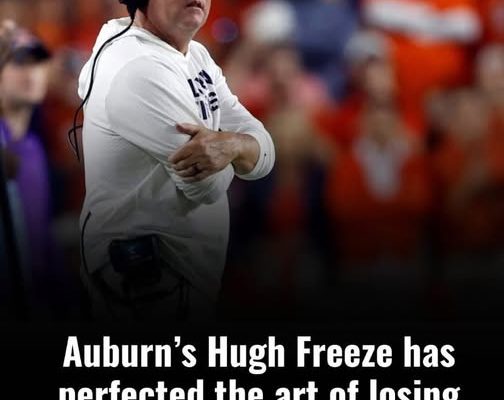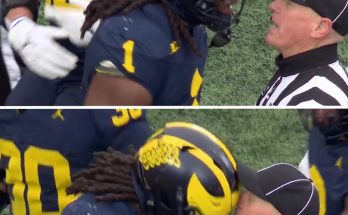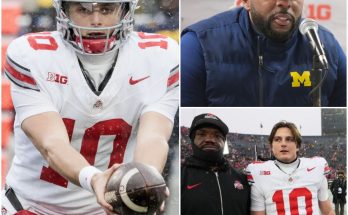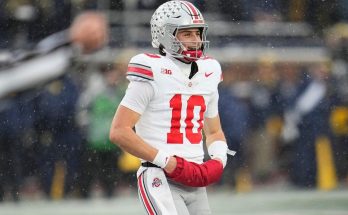Auburn’s Fight Without Finish: Three Straight Top-10 Losses Expose Hard Truths, Not a Coaching Crisis
There’s a fine line between being close and being good, and Auburn football is walking it right now. Three straight weeks, three straight heartbreaks — each against Top-10 opponents, each one a test of grit, discipline, and self-belief. The Tigers have gone toe-to-toe with college football’s elite and come up short by the slimmest of margins. But for all the frustration and noise outside Jordan-Hare, this isn’t a program in chaos. It’s a team searching for the missing piece — not a new direction.
To the untrained eye, three consecutive losses look like a slide. But context matters. Auburn’s schedule hasn’t been kind — facing a trio of national contenders while still finding its identity under head coach Hugh Freeze. The Tigers have battled ranked teams to the wire, showing fight, resilience, and flashes of potential that can’t be dismissed. What separates this Auburn team from past ones isn’t effort — it’s execution. The effort is there in abundance; the polish isn’t.
In college football, perception often outweighs nuance. Three losses can spark panic in a fanbase, ignite coaching rumors, and fuel critics who feast on frustration. Yet, those who actually watch Auburn every Saturday can see a program that’s not quitting. The Tigers aren’t being outclassed — they’re being outfinished. There’s a difference.
Auburn’s narrow defeats reveal both promise and pain. Against every top-tier opponent, the Tigers have had moments — extended stretches, even — when they looked like the better team. The defense has stood tall in key situations, the offensive line has held its ground against elite fronts, and the young quarterback room has shown glimpses of what’s to come. But when the lights have burned brightest, Auburn’s inexperience and inconsistency have crept in. The final five minutes of games — not the first fifty-five — have defined this stretch.
Hugh Freeze knew what he was walking into when he took over this program. Auburn was a proud but fractured team, trying to recover from years of turbulence and transition. Coaching changes, recruiting battles, and an unforgiving SEC West had left the Tigers searching for stability. Freeze was hired not just to win games, but to rebuild confidence — in the locker room, on the field, and across the fanbase. His task wasn’t to perform instant miracles, but to lay foundations. And that kind of work takes time, even if time is a luxury rarely afforded in the SEC.
Still, it’s worth remembering: this is a team that refuses to fold. Against ranked giants, Auburn hasn’t been dominated — they’ve competed. The scores don’t tell the full story of their grit. Every Saturday, they’ve shown heart, resolve, and belief, even when the scoreboard said otherwise. And that’s the mark of a culture taking shape. Freeze isn’t presiding over collapse; he’s overseeing construction.
If there’s a frustration among Auburn fans, it’s not that the team is bad — it’s that the team is so close. The losses have been narrow enough to sting deeply, because they suggest what could have been. One better decision here, one cleaner route there, one fewer penalty — and this conversation looks entirely different. That’s why the emotions are raw. Because deep down, everyone can see the potential. Auburn’s playing with the right mindset. They’re just missing the moment.
The truth is that turning close losses into signature wins isn’t about changing schemes or scapegoating coaches. It’s about maturing as a football team. Winning tight games — especially against top-tier competition — demands poise, experience, and trust. These are things that can’t be coached into existence overnight. They have to be earned through trial and error, heartbreak and growth. Every great program has gone through that phase. Georgia did. Alabama did. Even Michigan did. Auburn’s just in that uncomfortable middle — the stretch where the lessons are painful, but necessary.
Freeze’s philosophy has always emphasized discipline, execution, and empowerment. He’s not a coach who panics under pressure. He knows that programs aren’t built in press conferences — they’re built on Tuesday practices, film sessions, and locker room accountability. When he says that his team is close, he’s not offering empty comfort. He’s acknowledging reality. Auburn is competitive again. They’re respected again. Now they just have to learn how to win again.
And yes, that part is the hardest. Because learning to win isn’t about slogans or speeches. It’s about trust. Trusting the call, trusting the teammate, trusting the moment. Too often this season, Auburn has flinched when the game tightened. That’s not coaching incompetence — that’s inexperience revealing itself. The younger players, thrust into pressure moments, are learning on the fly. The veterans, tasked with leading through adversity, are finding their voices. There’s no shortcut through that process.
Critics love to reduce everything to the head coach. It’s the easiest target in sports. But firing a coach after a stretch like this isn’t leadership — it’s impatience disguised as passion. Freeze has shown he can build winners; his track record speaks for itself. What he’s doing now is harder — he’s trying to build sustainable success in a conference that eats mediocrity alive. That doesn’t happen with knee-jerk reactions. It happens with commitment, patience, and belief.
Auburn’s defense, led by a group of gritty upperclassmen and emerging stars, has been the backbone of the team through this stretch. They’ve stood up to physical, explosive offenses and made them earn every yard. They’ve forced turnovers in key moments, and they’ve kept games alive when momentum seemed to slip away. The problem isn’t stopping opponents — it’s finishing drives on offense. The red-zone inefficiency, the stalled fourth quarters, and the lack of explosive plays have all cost the Tigers dearly. But those are correctable flaws. They’re not systemic failures.
What’s not broken is Auburn’s identity. There’s no quit in this group. You can see it in how they tackle, how they chase, how they huddle after mistakes. You can feel it in the way the sideline stays engaged deep into the fourth quarter. They’re not beaten — they’re burdened by potential. And that’s a much better problem to have than apathy.
It’s also easy to forget that Auburn’s rebuilding process is happening under one of the most brutal gauntlets in college football. The SEC is unforgiving; every week feels like a playoff. While other programs get to find rhythm against unranked opponents, Auburn’s had to measure itself against giants. That kind of trial by fire can either break you or sharpen you. The Tigers, despite the record, are showing signs of the latter.
The uncomfortable truth is that Auburn isn’t far from being very good. But being “almost good” is the hardest place to live. It’s where confidence wavers, where criticism grows loudest, and where faith is most tested. This is the stretch that determines who sticks together and who starts pointing fingers. For Freeze, that’s the challenge — to keep the locker room united, to convince his players that these losses are lessons, not labels.
Fans, understandably, are tired of hearing about moral victories. Auburn’s tradition isn’t built on participation trophies. This is a program that measures itself by Iron Bowls, SEC Championships, and national relevance. But even the proudest programs have to endure rebuilding phases. What matters most is whether the losses produce learning or linger as scars. Freeze’s message to his team — and to the fanbase — must be that progress isn’t always linear. Sometimes, the steps backward are setting up a bigger stride forward.
College football moves fast. Narratives flip weekly. One big win can change everything — the mood, the headlines, the recruiting perception. Auburn’s close calls, frustrating as they are, mean that they’re within reach of that kind of turnaround. The next time they get into a one-possession game in the fourth quarter, the question will be whether they’ve learned enough from these past heartbreaks to finish the job.
What Auburn can’t afford to do now is lose faith in the process. Teams that panic after close losses usually end up unraveling completely. Teams that stay the course often find their moment. Freeze’s challenge is to keep belief alive — inside the building, on the field, and in the stands. Because if the players believe, the results will follow.
This isn’t the time for overreaction; it’s the time for reflection. Auburn’s effort against three straight Top-10 teams isn’t the mark of failure — it’s the sign of a team learning how to belong in those moments again. There are hard truths to face: the execution must improve, the mistakes must be cleaned up, and the offense must evolve. But those truths don’t add up to a crisis. They add up to growth.
And when the breakthrough comes — because it will — these close calls will become part of the story Auburn tells about its return to form. Every great team has that chapter: the one where they fought hard, fell short, and refused to quit. Right now, Auburn is living that chapter. It’s not pretty, it’s not easy, but it’s necessary.
So no, Auburn doesn’t need a new coach. It needs time, toughness, and trust. The Tigers are learning what it means to finish. They’re learning how to turn heartbreak into hunger. They’re learning that greatness isn’t built on avoiding pain — it’s built on enduring it.
The fight is there. The heart is there. The future is closer than it looks.
Auburn’s not broken. It’s becoming.



